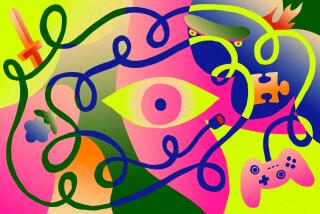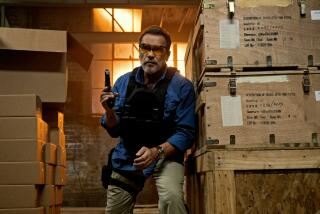Yacht Club Games finds there’s more retro life after ‘Shovel Knight’
- Share via
There’s a difference between a love letter to a genre and a complete re-creation.
To avoid tackling ground already covered when making video games that reference the 8- and 16-bit eras of the 1980s and ‘90s, Yacht Club Games co-founder David D’Angelo says one of his go-to references is “You’ve Got Mail.” Yes, the 1998 Nora Ephron-directed rom-com starring Tom Hanks and Meg Ryan. Or, specifically, its relationship to the 1940 Ernst Lubitsch-directed film that inspired it, “The Shop Around the Corner.”
“It’s the same thing,” D’Angelo says in discussing how the West Los Angeles team behind the retro hit game “Shovel Knight” developed the mission statement for Yacht Club. Viewing “You’ve Got Mail” alongside the original “The Shop Around the Corner,” he says, can at times be a challenge for audiences weaned on more recent acting and filmmaking techniques.
“In watching ‘The Shop Around the Corner,’ I could see why someone would want to remake it,” he says. “There are so many good things in it. A lot of them translate directly to ‘You’ve Got Mail,’ but ‘You’ve Got Mail’ was modern. And yet there are so many parts of the original movie that transcend time. That’s what we’re trying to do. We’re putting it in a new box that helps you understand why it’s important,” he says of each game.
Since 2013, when “Shovel Knight” became an early Kickstarter sensation, Yacht Club has been hyper-focused on games starring the hit’s titular hero — a knight, of course, armed with, well, a shovel. Sales reached 2.6 million across multiple consoles and iterations as he swung, dug and pounced his way through ghostly kingdoms filled with colorful characters, a conniving alchemist and the occasional exploding rat.
While the 24-person team isn’t abandoning its armored digger, Yacht Club is looking ahead to new projects and this year took on publishing duties, releasing “Cyber Shadow,” a title that nods to vintage Nintendo Entertainment System works such as “Ninja Gaiden” and “Shadow of the Ninja.”
The creation of Finnish developer Aarne Hunziker, “Cyber Shadow” (available for home computers and all major consoles) appealed to Yacht Club because it allowed the studio to continue mining history while attempting to refresh it.
“Cyber Shadow,” like 2018 Sabotage Studio revivalist title “The Messenger,” celebrates the quick sword-slash action of the vintage video game genre that keyed in on America’s pop-culture fascination with ninja films and ninja-inspired characters in the ‘80s. Protagonists, for instance, who operate mostly on their own but largely on the side of good. They are outsider heroes with smarts who tapped into an individualist ideal while exploring the tension between a belief in and a mistrust of institutions.
D’Angelo, now 35, doesn’t get too academic, however, when discussing his love of a genre he came to through “Teenage Mutant Ninja Turtles,” noting that the sci-fi-inspired mechanical world of “Cyber Shadow” also owes a heavy debt to “The Terminator.” The goal was a game that captured the instant approachability of NES titles, but was more forgiving to players while using varied, unexpected level design while gradually layering on abilities, all while staying true to a two-button control scheme.
D’Angelo even laughs a bit at the difficulty in explaining the addictive appeal of the works that influenced “Cyber Shadow.”
“The gameplay of it is so unbelievable simple,” D’Angelo says. “It’s sort of hard to say why it would be fun. Like, I jump and I hit an enemy and it’s dead in one slash. That’s all there is to it.”
But when it’s responsive, that frenetic energy, says D’Angelo, “really puts you in the mood of being a ninja.”
“When I press a button, I’m immediately six feet in the air, and when I press that button again, I’ve completely disintegrated a robot,” he says. “Giving that power to someone who’s even 4 years old is not something you can experience any other way.”
So what then makes “Cyber Shadow” a 2021 game rather than a 1990 one? “The main reason is just this starts really simple, and slowly over time the complexity of the character grows. It’s still a two-button game, but the number of actions you can do is 12 or something like that.”
Adds studio producer Sunni Pavlovic, “I don’t think it’s so much about capturing the retro nostalgia one for one. When I think of older games, it’s about capturing the feeling. How did that feel when you were 8 or 10? But making it still have the modern sensibilities we’re used to, whether it’s the color scheme or fonts we’re used to.”
Or more diverse characters and a broader understanding of the cultural role games can play. And while some studios and players gravitate toward retro-styled games because they crave the sometimes punishing difficulty of titles of that era, when save points were uncommon and grueling challenges were seen more as a badge of honor, D’Angelo and Pavlovic stress the Yacht Club thesis is to show that play is approachable and joyful.
“Shovel Knight,” for instance, kept things interesting with updates and new playable characters, necessitating a rethinking of the level design to respond to different abilities rather than trying to make a piece fit where it didn’t belong. While “Cyber Shadow” isn’t as vast a game — and it also isn’t exactly easy — players will discover a rhythm as new moves and interactions are learned. And while there are hidden paths and plenty of traversal, “Cyber Shadow” varies the pace with relatively intimately framed boss battles, requiring a more nuanced focus.
Above all else, however, Yacht Club’s core goal is to distill games down to a base language. It isn’t currently interested, for instance, in taking full advantage of today’s controllers with their multiple triggers and joysticks.
“It’s really complicated,” D’Angelo says. “The games are using all those buttons and using them in context-specific situations. You get in a helicopter and that controls differently than when you’re in a plane and that controls differently than when you’re walking on the ground. That could be cool, in that the complexity of the interactions leads to variety, but we were really thrilled how you could get the same level of depth out of just maybe three things.”
And while the “Shovel Knight” story is finished for now — “We’re exhausted,” D’Angelo says, referencing the eight-year focus on the brand — the studio likely won’t stay away forever. Someday, says D’Angelo, the team dreams of seeing a “Shovel Knight” cartoon become a reality, and Pavlovic succinctly sums up the Yacht Club mindset when it comes to in-house developed, non-”Shovel Knight” games.
“Something that’s really important to us is that it should be heartwarming,” Pavlovic says. “It should be uplifting. It should be positive. That’s something we need. There are world events happening around us, and I know for myself I don’t want to play a game where it’s a dystopia.”
More to Read
The biggest entertainment stories
Get our big stories about Hollywood, film, television, music, arts, culture and more right in your inbox as soon as they publish.
You may occasionally receive promotional content from the Los Angeles Times.











